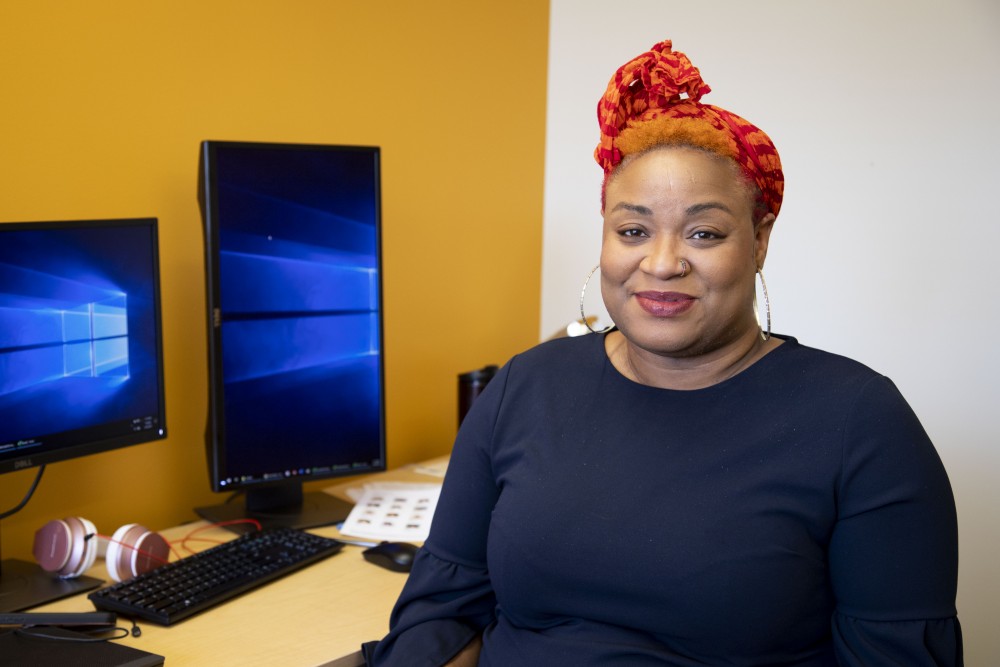The University of Minnesota introduced a new assistant professor to the Humphrey School of Public Affairs this fall with a unique perspective on urban and disaster planning.
Assistant professor Fayola Jacobs brings a black feminist lens to topics of disaster planning, environmental justice and urban planning. After participating in a University initiative this past year as a postdoctoral associate, Jacobs began a faculty role in the urban and regional planning program for the fall.
Jacobs grew up on the Caribbean island of St. Kitts, where she experienced frequent hurricanes and other disasters growing up. While she did not realize it at the time, she said, disasters would end up framing the way she views oppression, historical racism, the environment and urban communities today.
While disasters are a horrible, traumatic occurrence, they create a tight sense of community that can shed a light on ways to reimagine a different future, Jacobs said.
“It was obviously a sad time, but … you see all these people that you haven’t seen in years and people are talking to each other and connecting and checking on each other,” she said.
Jacobs said disasters can make inequities more visible, such as when poorer communities are hit harder by disasters due to infrastructure that is less maintained, or when certain groups live in more vulnerable areas due to historical oppression.
Jacobs mentioned the flat coastal areas of St. Kitts, where enslaved people used to work on sugar cane plantations, and how these areas are more susceptible to hurricanes. These historically oppressed communities still live in the areas today, she said, and suffer from more disasters than other groups.
After completing her undergraduate degree at York University in Toronto, Jacobs spent around three years running anti-oppression workshops. Her goal was to make safe places for people of color and immigrants to access mental health support, something that is typically viewed as very white, she said.
It was during this experience, she said, that she realized teaching would always be a part of her.
Humphrey School Dean Laura Bloomberg noted Jacobs’ special ability to understand students and teach in ways effective to them.
“Like all good educators, she has an empathic view of the learners,” Bloomberg said. ”She can get inside the head of the learners and think, ‘What is going to resonate with them?’”
Jacobs continued her education at the University of North Carolina-Chapel Hill, where she said she discovered her passion for disasters.
After earning her Ph.D. at Texas A&M University, where she was able to learn from many big names in urban planning and disaster research, Jacobs moved to Minneapolis. Here, she joined the Co-Developing Research and Engaged Approaches to Transform Environments initiative at the University. CREATE is a community-based program that examines how environmentally friendly resources and clean water can be more accessible and equitable.
Jacobs emphasized that she hopes to contribute to the communities in the area and wants to be aware of the ways she is impacting those around her. She said she wants to be cognizant of her possible contribution to gentrification and the history of the land she is inhabiting.
Mira Klein, a research associate with the CREATE initiative, said she worked closely with Jacobs. She said the work was made easier by the fact that Jacobs was funny, sarcastic and joyous.
”I think that there’s a different type of work that people are able to accomplish when we like each other,” Klein said. “The conversations that we’ve been able to have and the relationship that we’ve been able to build, especially on a community-based project, have been more sincere and authentic and successful because she’s fun.”
Jacobs said because oppressed groups have often been denied resources and access to higher education in the past, their knowledge isn’t always represented in mainstream scholarly material.
“If we are acknowledging that people have been denied resources, the reality is, their knowledge might not show up in an academic paper,” she said. “But where might it show up?”
Jacobs works to include a more diverse range of materials and tools to teach her students in nontraditional ways, such as engaging with podcasts, blogs and social media pages created by activists.
University Ph.D. student Julia Brokaw said she is already learning a lot in Jacobs’ environmental justice class, and emphasized her ability to make students feel comfortable in the classroom.
“When you have a really great teacher they just have like an aura about them, that when they walk into the room you can already just feel that it’s a space where your voices are heard,” Brokaw said.
















